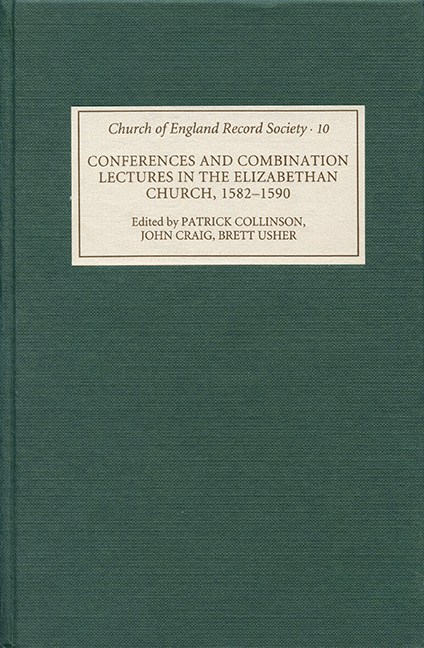Book contents
- Frontmatter
- Contents
- List of illustrations
- Abbreviations
- Dedication
- Preface and acknowledgments
- Introduction
- The Texts
- Biographical Register
- Appendices
- Appendix 1: Dedham grammar school
- Appendix 2: The Dedham lectureship
- Appendix 3: A Sermon preached by Edmund Chapman
- Topical and General Index
- Index of Personal Names
- Index of Place-Names
- Index of Scriptural References
- Index of Classical, Patristic, Medieval and Reformed References
Appendix 3: A Sermon preached by Edmund Chapman
Published online by Cambridge University Press: 26 May 2017
- Frontmatter
- Contents
- List of illustrations
- Abbreviations
- Dedication
- Preface and acknowledgments
- Introduction
- The Texts
- Biographical Register
- Appendices
- Appendix 1: Dedham grammar school
- Appendix 2: The Dedham lectureship
- Appendix 3: A Sermon preached by Edmund Chapman
- Topical and General Index
- Index of Personal Names
- Index of Place-Names
- Index of Scriptural References
- Index of Classical, Patristic, Medieval and Reformed References
Summary
‘A Sermon preached by Mr D Chapman at Dedhame in essex upon the fyrste to the coryntheans the 3 chapter 7.8.9. verses therof’
The only sermon by Edmund Chapman known to survive consists of six-and-a-half closely-packed manuscript pages, occupying folios 34r to 37r of Ellesmere MS (EL) 34 B 5 preserved at the Huntington Library, San Marino, California. It ends in the middle of folio 37r with the postscript ‘Soli deo gloria amen yo[u]r lovyng frend in christ/Rychard Parker’, in the same hand which has written the rest. Since the writer is unlikely to have been Parker himself, we appear to be confronting a more-or-less accurate copy of a transcript which Parker originally made either from Chapman's papers or from full sermon notes taken by him when he heard it delivered.
For what reason, and by what route, did this sermon come into the possession of Sir Thomas Egerton 1st Lord Ellesmere? If it is indeed a copy, why does Parker's own original manuscript not survive among the papers preserved as Rylands MS 874? There are no obvious answers to these questions. Forensic problems aside, the sermon is obviously of intrinsic interest to historians of the Stour Valley but its content, perhaps laundered for transcriptional purposes, is both problematic, limited in its implications and anodyne. The verses from Paul's first letter to the Corinthians on which it is based are used to support the central thrust of Chapman's principal theme: that godly congregations are duty-bound to support their godly pastors – morally, legally, spiritually and financially. As it now exists it is impossible to tell whether it reflects Chapman's eirenical disposition or whether, on the contrary, it was polemically intended. The latter seems the more likely reading. Although it is stated that the sermon was preached in Dedham, it is tempting to link it with the induction of Richard Crick to the deeply divided church of East Bergholt in 1587. Alternatively, it directly addresses (for it certainly echoes) the principal concerns of John Keltridge during his beleaguered year in Dedham in 1577–8. In the latter case it may have been preached regularly by Chapman as a stick with which to beat Dedham's ‘alternative congregation’ and accepted by Parker on his arrival in 1582 as a ‘standard text’ which he took the trouble to imbibe and memorize for himself.
- Type
- Chapter
- Information
- Conferences and Combination Lectures in the Elizabethan Church: Dedham and Bury St Edmunds, 1582–1590 , pp. 277 - 278Publisher: Boydell & BrewerPrint publication year: 2003



